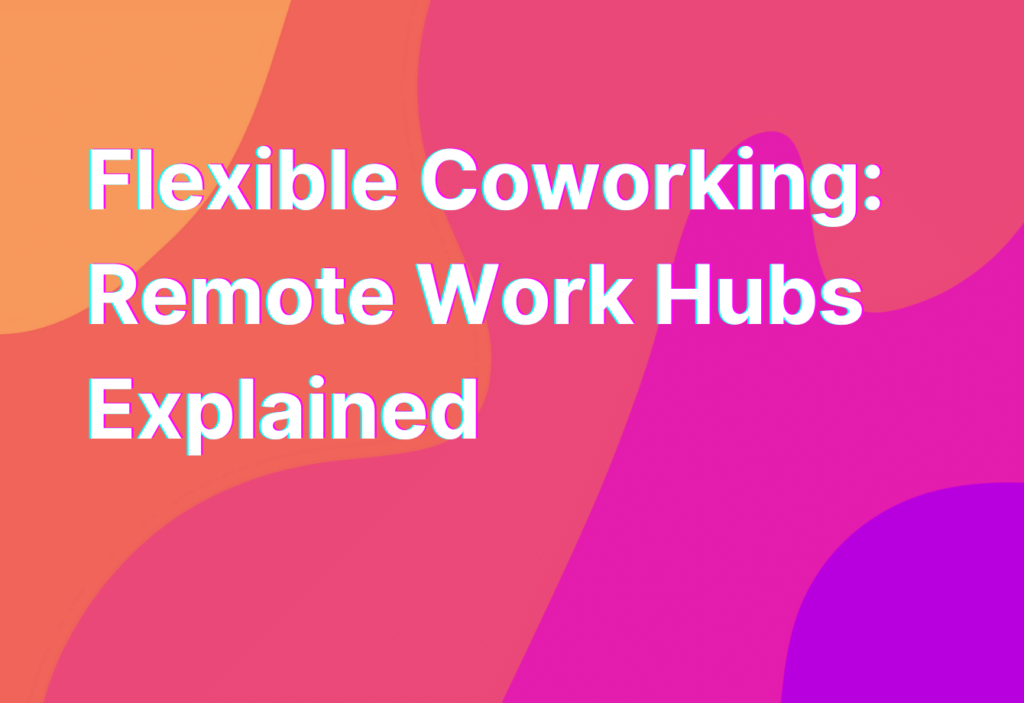Flexible Coworking: Remote Work Hubs Explained
Hey there, remote work enthusiasts! It’s Ashley here, your friendly remote work advocate with 10 years of experience in the tech industry. Today, I want to talk to you about the wonderful world of flexible coworking and how it can revolutionize your remote work experience. So grab your favorite cup of coffee and let’s dive in!
What is Flexible Coworking?
Flexibility is the name of the game when it comes to remote work, and flexible coworking takes it to a whole new level. It’s all about finding a workspace that suits your needs, whether it’s a bustling coffee shop, a quiet library, or a dedicated coworking space. The beauty of flexible coworking is that it allows you to choose where and when you work, giving you the freedom to create your ideal work environment.
One of the key benefits of flexible coworking is the opportunity to connect and collaborate with like-minded individuals. Remote work can sometimes feel isolating, but by joining a coworking space, you can surround yourself with a community of fellow remote workers. It’s a great way to network, share ideas, and even find new job opportunities.
Types of Remote Work Hubs
Now that we’ve covered the basics, let’s take a closer look at the different types of remote work hubs available:
- Coworking Spaces: These are dedicated workspaces specifically designed for remote workers. They often provide amenities such as high-speed internet, meeting rooms, and even free coffee (because let’s face it, coffee is essential for productivity!). Coworking spaces are a popular choice for remote workers who crave a professional environment and the opportunity to network with other professionals.
- Coffee Shops: Ah, the classic remote work spot. Coffee shops offer a cozy and familiar atmosphere, not to mention the delicious aroma of freshly brewed coffee. While they may not have all the amenities of a coworking space, they provide a great alternative for those who prefer a more laid-back work environment.
- Libraries: If you’re looking for a quiet and distraction-free workspace, libraries are the way to go. With their serene atmosphere and abundance of resources, libraries offer the perfect setting for deep focus and productivity.
- Community Centers: Some communities have dedicated spaces for remote workers, often located in community centers or local government buildings. These hubs provide a convenient and affordable option for remote workers who want a dedicated workspace without the commitment of a long-term lease.
- Virtual Coworking: In the age of technology, virtual coworking has become increasingly popular. Platforms like Trello and Slack allow remote workers to connect and collaborate online, creating a virtual coworking experience. It’s a great option for those who prefer the comfort of their own home but still want to be part of a remote work community.
The Benefits of Flexible Coworking
Now that you know the different types of remote work hubs, let’s talk about the benefits of flexible coworking:
- Increased Productivity: Working in a dedicated workspace can help boost your productivity. The absence of distractions and the presence of like-minded individuals can create a motivating environment that keeps you focused and on track.
- Networking Opportunities: Coworking spaces and other remote work hubs are a hotbed of networking opportunities. You never know who you might meet and what connections you might make. It’s a chance to expand your professional network and open doors to new opportunities.
- Work-Life Balance: Flexible coworking allows you to strike a balance between work and personal life. You have the freedom to choose when and where you work, giving you the flexibility to attend to personal commitments without sacrificing your professional goals.
- Community and Support: Remote work can sometimes feel lonely, but with flexible coworking, you can be part of a community of like-minded individuals. It’s a support system that understands the unique challenges and joys of remote work.
- Cost Savings: Coworking spaces often offer flexible membership options, allowing you to choose a plan that fits your budget. Plus, you can say goodbye to expensive coffee shop bills and enjoy the perks of free coffee in many coworking spaces!
So there you have it, folks! Flexible coworking is a game-changer for remote workers, offering the freedom to choose where and when you work, the opportunity to connect with a community of like-minded individuals, and a host of other benefits. If you want to learn more about the gig economy and how coworking spaces fit into the remote work landscape, check out this link. Happy coworking!


